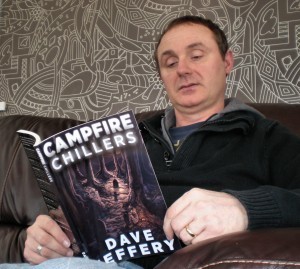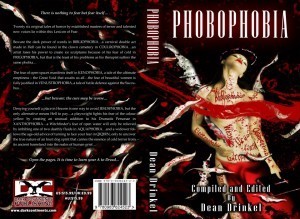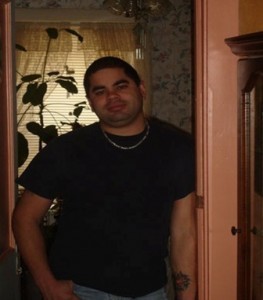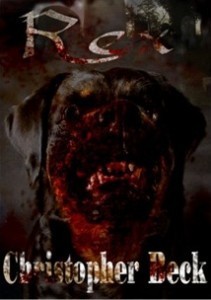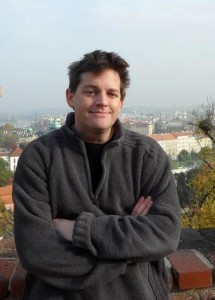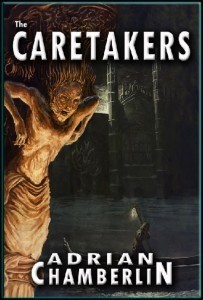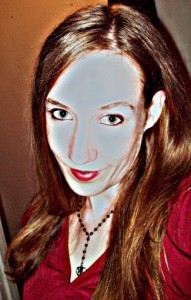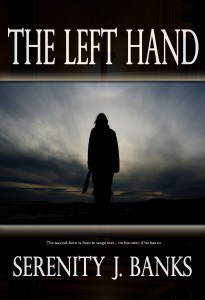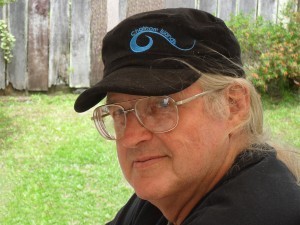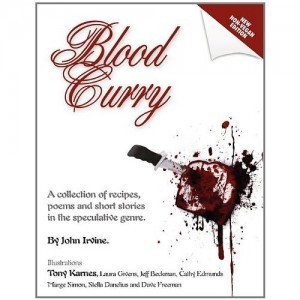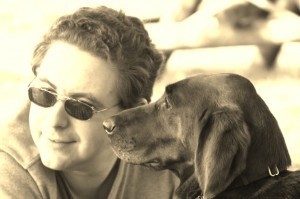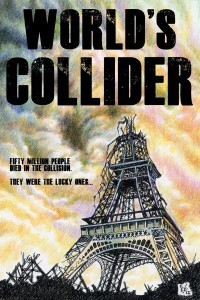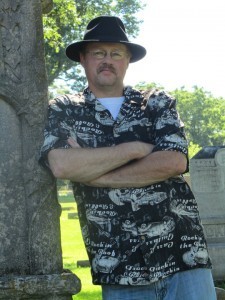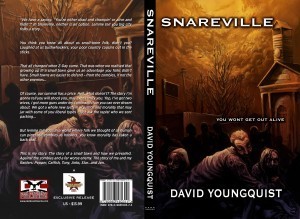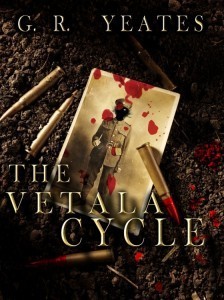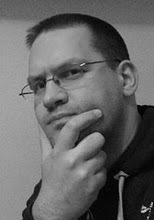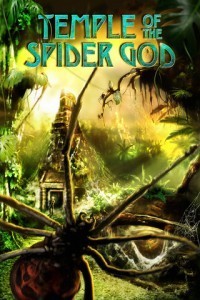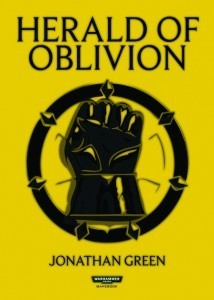G.R. Yeates's Blog, page 7
April 25, 2012
“What do you fear?” Wednesday welcomes Dave Jeffery
Today, I welcome Dave Jeffery, author of the best-selling Necropolis Rising, to tell us about what he fears the most.
1. Your story in the Phobophobia anthology is about Frigophobia – fear of cold. What was the original inspiration for this or were there a number of sources that you drew upon?
The idea for frigophobia came from a chance revisit to the movie Groundhog Day when Bill Murray is carving ice sculptures. I’ve always been fascinated with the talent it requires to work in unconventional mediums; clearly the skill and precision of such a talent takes exceptional dedication to the craft. I thought about this as I watched the movie, just how many Groundhog Days it would take for Murray’s character to perfect the art. Then I though about what would happen if you lost the ability to do that; what could make that happen? If you became afraid of the very medium in which you worked? From here, the roots of the story took hold.
2. What do you fear? Tell me about your own phobias.
I have always been terrified by the thought of decapitation. This originated from reading William Peter Blatty’s Legion (at an age I really shouldn’t have) when the Gemini killer is talking about how a severed head can see for a period of time after it has been removed from the body. I have goose bumps as I recall this. So thanks!
3. Dr Tiernay is a psychiatrist but she is also a wounded individual – mental health carers and professionals often bear their own scars, why did you decide to make this a part of the character’s persona?
The best carers are those who have been through the experience. They have a level of empathy that those who look in can never quite understand. It made sense to have Tiernay as one who is expert through experience. This is what makes her such a specialist. She is someone who Swanson is more likely to seek out in order to find an effective resolution to his phobia.
4. Bobby Swanson suffers from the ultimate artist’s nightmare – being unable to create, having an accident kill his vital connection with his craft – is this a fear you suffer from? What do you think it would be like to not only no longer write but also to lose the joy of doing so?
I think this is pertinent to any artist working in any medium. I have written elsewhere that artistic will is innate for some people, it cannot be turned off. I often think of those who are crippled with strokes and how they must feel, trapped in a body that doesn’t work. Are they screaming out at a world that just isn’t able to hear them?
5. You reference Mary Shelley’s Frankenstein in the story, do you think people do create their own monsters? Much was made, when Frankenstein was adapted as a stage-play, out of the relationship between the Creator and the Monster – each being seen as a mirror of certain hidden aspects of the other.
The brain is a powerful, and mostly uncharted, organ. More often than not the impact of experience creates potentially more damage than organic disease. It’s how we cope with the psychological assault than determines if our mind becomes maligned. A damaged mind is, after all, a place for monsters to grow. How we tether them is the important issue.
6. Tell me more about your collection, Campfire Chillers, where did the stories come from and were you conscious of going back to the roots of the genre i.e. the scary story told by firelight to make us jump at the shadows?
I have always been a lover of genre short stories and TV shows like the Twilight Zone, Outer Limits and Armchair Theatre. I guess the real inspiration for Campfire Chillers came from the movie Creepshow where you had a selection of grisly tales with a sinister figure introducing the tales. In Campfire Chillers this is the Scoutmaster, and we have an introduction to each story, a kind of morality tale in itself, in order to establish the theme. This is very Twilight Zone of course but I couldn’t resist it. There are thirteen tales ranging from ghost, paranormal and just in your face horror. I wanted to bring the idea of the traditional campfire story up to date but infuse it with the books, TV shows and movies of my youth. The book is now long-listed for the 2012 Edge Hill Prize and sort of confirms that it has, in some part, worked as a collection.
7. Your novel, Necropolis Rising, has been widely praised. Where did the original idea for it come from and what do you think it is about the zombie that is striking a chord with the horror audience at the moment?
I have wanted to write a zombie novel for many years. I’m a huge fan of the genre and recall watching movies such as Dawn of the Dead and Zombie Flesh Eaters in my early teens on my dad’s VHS recorder when he was asleep. By the time I’d accrued the impetuous and the skills to write something legible, I found that the zombie genre wasn’t moving on as such. Whilst I enjoy the apocalyptic elements of the genre, it had literally been done to death. I made a decision that I wouldn’t write the book until I had a premise that looked at the genre from another angle. A few years ago I came up with the concept that the zombies should be more an obstacle than a blatant threat and wrote a story based around this premise. It seemed to work and has been well received by the staunch zombie community and those new to the genre.
8. On a more sombre note, your novel, Finding Jericho, discusses and faces the realities of growing up with mental illness in the modern world. What was the motivation behind writing this work? What did you hope to achieve?
I have worked in mental healthcare for 28 years this month. The motivation for writing Finding Jericho was simple: to raise awareness of its impact upon the person and their family. The book is about dealing with the stigma of mental illness, told through Jon who has to deal with his uncle’s illness. Jon represents the hope that a well informed society will change its perceptions of what is and isn’t madness. The book is testament to the sufferers and survivors I have had the honour to meet during my career.
9. Tell me about one of the other stories in Phobophobia that you enjoyed and why?
Jesusophobia by William Meikle. I love the pace and how Meikle balances dry wit and dread with consummate ease.
10. So what does 2012 hold for Dave Jeffery? Any last words?
Wow, 2012. A lot of things are in the pipeline. Firstly, Finding Jericho is being re-issued through Hidden Thoughts Press in April/May. I have short stories appearing in publications by Wicked East Press, Hersham Horror Books and Stumar Press. I am currently halfway through the sequel to Necropolis Rising for Dark Continents Publishing and have received the green light from pulp icon Guy N Smith to co-author the seventh book in the Night of the Crabs franchise. Busy, busy as they say. But, hell, it beats working for a living, right?
Phobophobia is available at the following links:
[image error]
Campfire Chillers on Kindle UK
Campfire Chillers on Kindle US
[image error]
Necropolis Rising on Kindle UK
Necropolis Rising on Kindle US
Author Website
Publisher of Finding Jericho:
Tweet
April 19, 2012
Phobia Friday welcomes Christopher L. Beck
This Phobia Friday I would like to welcome Christopher L. Beck for his turn on the blood-stained psychiatric couch.
1. Your story in the Phobophobia anthology is about Nosocomephobia – fear of hospitals. What was the original inspiration for this or were there a number of sources that you drew upon?
My nephew and I were sitting in Barnes and Noble a day or so after Dean M. Drinkel gave me the letter N, he was reading, I was looking up phobias that began with the letter. I narrowed the choices down to three; the two of us talked about each one in depth but were leaning towards Nosocomephobia the whole time. In the end, as an excuse to talk to attractive ladies, I went and asked the three working the coffee counter what they thought. After hearing the three choices, they all agreed fear of hospitals sounded like the best choice.
2. What do you fear? Tell me about your own phobias.
A bit of back story first.
Growing up my dad had multiple heart attacks and I watched, on more than one occasion, as EMT’s carried him from the house. During his times of recovery I was sent off to live with friends of the family.
Years later, after my mom and dad had separated, my mom was diagnosed a paranoid schizophrenic. At the age of thirteen I watched as she changed—her mentality becoming childlike again—and was plagued by seizures and psychosis. She was in out of public and private metal institutions and I was sent to live with others for a time, before moving into my grandma’s.
At the same time mom was dealing with her illness, dad had a stroke that left him childlike and half of his body paralyzed.
Then, in April of 1996, I heard my mom take her last breaths and found her face down on the floor. Two months later dad passed. I was sixteen years old.
There is more to the story than what is above but the rest is for another time. I just wanted to set the stage, if you will.
So, to finally answer the question, my greatest fear is my soon-to-be-ten-year-old step-daughter experiencing any of the horrors I witnessed as a kid; or anything worse.
Oh, and I also fear never seeing my step-daughter again. I wasn’t able to talk to her or see her for an entire year after my wife and I separated and it was hell. I’ve lost my parents, and others, but losing a child, in any way, is a different beast.
3. Hospitals are places of healing, so why do they serve so well as a setting for horror?
Because most people, I assume, associate hospitals with death. And, despite the healing aspect, having a loved one end up in a hospital is a fear for most and real life horror when it happens. Also, there are some crazy and scary things that happen in hospitals. My ex-wife works at one (she was a help with my story) and she has told me some wild stories.
4. T he crazy old man who haunts Derek throughout the story and in a number of guises – was he intended to be an avatar of the schizophrenia that he suffers from?
In a way, I suppose, though I never sat down and told myself as much. My grandma was in the hospital a few years back and a crazy man kept barging into her room in the middle of the night, yelling and screaming at the top of his lungs. It scared the shit out of her; it haunted her during her time there. So, I borrowed from her experience (and from my mom’s illness) and used a crazy old man to haunt Derek. All of us have been or are haunted by something. Derek was haunted by his illness.
5. Derek becomes trapped in the hospital and the hospital becomes a nightmarish labyrinth the more he tries to escape – was the nightmare hospital a way of showing how trapped one can feel by fear and mental illness? Certainly, in the case of the latter, someone’s life can become a series of episodes as they return again and again to institutions and psychiatric wards.
Not only a series of episodes for the ones suffering from mental illness, but also for their loved ones.
The hospital, I feel, not only embodied how one can feel trapped by fear or illness (of any kind), but how one, especially in these times where the economy is down and jobs are hard to come by, can feel trapped by life. Not everyone has it easy, or attains their dreams; somehow, someway, they get stuck in a rut and can’t seem to find a way out.
6. The balloon girl operates dualistically in the story – she seems to represent hope but underlying that are darker undercurrents. Were you intending her as a critique on saccharine representations of ‘hope’?
You didn’t only make me think with this question, you made me psychoanalyze myself, too. Jesus.
I think most people, and I’ve been guilty of this, just rely on hope way too much. Sure, it’s a good thing to have but you can’t just rest on your laurels once you have it. Most of the things you hope for won’t come unless you work for them.
I also think people rely and depend too much on others and God and other supreme beings, hoping for help when they should be helping themselves.
On a more personal level, the balloon girl was me coming to understand all of this. I have not had the best life, I’ve not had the worst life, but I have had a hard one, so it’s been easy for me to hope for anything and everything and expect to get it all, like I deserve it. But I don’t. Hope is one thing I’ve maintained throughout my life but I’ve often misplaced it, and spent years waiting for the things and changes I hoped for to just appear or happen. I know better now.
Of course there are certain cases when all you can do is hope.
7. You are known for your visceral and explicit style and some have drawn comparisons between yourself and Richard Laymon – how do you feel about that?
I’m fine with it, love it actually. I think it is an honor. However, I wouldn’t dare compare myself to him or any other writer.
8. With stories like this one and Lonesome Night under your belt, I have to ask the question, are you a Silent Hill fan? And, as one of the current breed of new tech-savvy indie authors, what are your thoughts on how we now absorb narrative through different media such as the Kindle, video games and even our mobile phones?
I am a fan of the movie. As far as the games go, I watched my oldest brother play the first game when it came out and have talked some about the newer games with my niece and nephew but that’s it.
With books, newspapers, magazines, games, etc., just a few taps away, it is easier for us to find and absorb narratives, and that’s not necessarily a bad thing. There are all kinds of stories, fictional and non-fictional, out there, waiting to help or inspire someone.
9. Tell me about one of the other stories in Phobophobia that you enjoyed and why?
Traci McBride’s Symbols of Damnation. It was a fun, creepy read.
I’ve known bullies like Claire, and, when I was younger, was tormented by my siblings, so I could feel for Felix. Plus, the end made me think of an old friend who once burned down an abandoned church.
I am glad you didn’t ask me to pick a favorite as I’ve enjoyed all of the stories in this anthology.
10. So what does 2012 hold for Christopher L. Beck? Any last words?
Good things, I hope. I have a number of stories out and about right now, as well as a novella, and a there’s a possibility of a collection of my own, but nothing is set in stone. Currently I am working on a longer piece of fiction and with my biggest cast to date. I hope to finish it in the next month or so and then try to find a home for it. I would like to say thanks to Sean Sweeney for mentioning my name to Dean. Thank you, Dean M. Drinkel, for reaching out and taking a chance on me. And, thank you, Greg, for the time and thought you’ve put into this series of interviews.
Thank you, Chris!
Phobophobia is available at the following links:
Rex is available at the following links:
Connect with Christopher L. Beck at: http://www.facebook.com/chrifive
Tweet
April 18, 2012
“What do you fear?” Wednesday welcomes Adrian Chamberlin
This Wednesday I would like to welcome Adrian Chamberlin, the UK Liaison for Dark Continents Publishing, scourge of the Wallingford Bunkfest and author of things most squamous!
1. Your story in the Phobophobia anthology is about Aquaphobia – the fear of water. What was the original inspiration for this or were there a number of sources that you drew upon?
A number of sources. I’d been on a historical fiction kick for sometime, had just completed a horror story set during the English Civil War for the Weird War Anthology. I wanted to write another tale in that period, and the most obvious choice for a phobia story was water, as the “swimming” of suspected witches would lead to all sorts of psychological damage – if the suspect survived, of course…
I wanted to mix things up a bit, though. Rather than rely on the realism of films such as Witchfinder General, I wanted to inject a large dose of the supernatural and turn the witch from victim to agent of evil. It also muddies the water (so to speak) on the morality of the protagonists. There is no doubt Matthew Hopkins was an evil man, enriching himself by the suffering of innocents; yet in this take the witch is real and Hopkins becomes the victim. What he suffers is, to my mind, richly deserved, and Mistress Moore’s curse could be seen as payback for the suffering Hopkins inflicted on all women, be they witches or not.
As you can tell, I had a lot of fun with this piece. The choice given to the witchfinder at the end is no real choice at all, but I left it up to the reader to decide which of the waters he will take.
2. What do you fear? Tell me about your own phobias.
The only physical object that scares me is scorpions. That’s in my Room 101. But as for other, irrational fears…I hosted a workshop entitled “Feel the Fear” at the Verulam Writers’ Conference in February and had a bit of a panic attack. Stage fright, really; although I’m used to public speaking, anxiety took a hold of me and made me freeze up half way through the session. Interestingly, some of the attendees told me it helped the session, in that everyone got to experience group fear and they witnessed a practical demonstration of what fear can do to the body and mind – and this from a horror writer!
I’m not certain if it’ll stop me hosting another workshop, or moderating a panel as I did at FantasyCon 2011. But I fully expect to have the memory of this event playing on me if I do more public speaking. Will it have the same effect as last time, or will I be ready for it? I honestly don’t know – and in a way, that frightens me even more.
I’ll be discussing this in depth on a guest spot on Emma Audsley’s Horrifically Horrifying Horror Blog in May.
3. You have written a number of stories with historical settings – what is it that appeals to you about setting horror in the past rather than the present?
The past is such a rich playground. I’ve been a history nut ever since school, and whichever period I study, what fascinates me is how similar to us our ancestors were in a world or civilisation that seems so alien to us. It’s a chance to write something different, to explore the values and standards of that society or civilisation and how the people of that period react to horrific events. In times when life was cheap, and death was ever-present, you may expect characters will react to a corpse or a brutal killing differently to us. And yet the human reactions are still the same; the grief of loss and the pain – and mystery – of death cross the ages.
I’m also fascinated by the role religion plays. In an age that is increasingly irreligious, we’re tempted to look back to days when faith played a central role in people’s lives. And yet, the certainty of life after death offered by these religions means nothing when a person is confronted by the threat to their own mortality.
4. Your approach to the witchfinder and the witch in your story emphasise the supernatural over naturalism, the latter might be argued to be more common in the genre these days – is this your preferred mode for horror?
Absolutely. I know the mark of a quality supernatural tale is ambiguity: when the reader is uncertain if the threat or terror is a figment of the protagonist’s mind or a real entity in its own right. However, I’ve always preferred my work to wear its supernatural heart on its sleeve. What fascinates me about the supernatural is how people respond to – and cope with – a menace that is not only beyond their ability to fight, but beyond their comprehension. How do you fight something you know cannot exist? How do you react, physically and emotionally? What price do you pay for successfully defeating this evil?
I believe we’re seeing a return to the fantastical elements of horror. In the 1990s, supernatural horror had been done to death and readers went back to basics: nothing is more terrifying than the human monster, and what mankind does to itself. But there’s only so much you can do with that in a horror story, and so we saw a shift from psychological horror into the crime genre/police procedural thriller while the supernatural titles fell out of publishers’ favour.
But as healthy as the crime genre currently is, I can see a desire for horror in its classic form, with supernatural threats and monsters. It’s no coincidence that supernatural horror is growing in popularity against a background of economic hardship and uncertainty, just as it did in the early 1980s recession. A hunger for escapism and an externalisation of fear in monsters or forces that bear little relationship to humanity is more apparent now.
5. As in The Caretakers, your story shows an interest in the power of mysticism, ritual and myth – does this come from a personal interest? Is there a particular body of myths that you find most inspiring?
Faith and religion are powerful motivators for people – and therefore characters in historical fiction. I’m fascinated by periods in history when religions collide – or when one usurps the other. All my life I’ve been interested in pre-Christian religions and folklore, particularly Celtic and Norse: initially because of the myths and legends they created, but as I got older what gripped me is the realisation of a human need, seen in every period and every part of the world, to make sense of the world around you. To give the mysterious parts of our planet – and life itself – names and labels and faces, benign or evil: because once you’ve done that, even if it makes no logical sense, you’ve begun to make terms with the hostile parts of the world. Bit like horror fiction, I guess…
6. You have also written for the Lovecraft eZine – H.P. Lovecraft can be as contentious a figure in horror literature as he is an inspirational one – what’s the fascination for you? Where does it stem from? Why do you think some people don’t ‘get’ it when it comes to the Old Gent and the Mythos?
I grew up with a love of pulp horror. The higher the bodycount and the bigger the scary monsters, the happier a child I was; to me, that was all that horror fiction consisted of!
I was thirteen when I read The Call of Cthulhu and it blew my mind. Horror fiction hadn’t truly scared me until then, and this story marked a watershed for me. Not only is it a superbly crafted tale in its own right, it introduced a new way for me to look at the world. The concept of cosmic horror, with alien gods and the rending of veils between planes, has remained with me and influenced my own fiction ever since.
I can see why Lovecraft isn’t for everyone: I waded through a lot of his fiction and came away disappointed until I read Shadow over Innsmouth and At the Mountains of Madness. The purple prose in some of his pieces can be very off-putting, and it’s easy to parody his work: “what unmentionable namelessness lurks in the nitrous vaults of the alehouses of the cyclopean ruins of Wallingford?” And so on…
But the concepts he created and the sense of terror with which he imbibes the cosmos are hard to beat. He created a literary sandbox where anyone is welcome: to improve on the themes, expand the concepts or just to play around. I did the latter with a literary mash-up of Shadow over Innsmouth and Daphne du Maurier’s Jamaica Inn which was huge fun (and very tempted I was to call it “Jamaica Innsmouth”).
7. Tell me more about your current projects – Fairlight and Snareville III?
Fairlight is a supernatural thriller in which malevolent forces attempt to gain access to this world via teenagers who self-harm. I’m quite pleased with the monsters I created for this, and I think HPL would nod in approval. That should be complete by the summer, but won’t be released until next year.
Snareville III is a collaboration between myself and DM Youngquist, and is a continuation of his zombie apocalypse saga. What makes this unique is that I’m writing the story from the British side of the pond, three years after the apocalypse has taken place. Youngquist explored the effect of Z-Day on the less-populated areas of the American Midwest, and I’ve focussed on the new medievalism that has taken hold of a devastated Britain. The two sides of the story combine when the Snareville gang come to the UK, but there’ll be surprises for them. Crucified zombies and a fanatical cult determined to bring the body of King Arthur back to life results in a nightmarish climax on the summit of Glastonbury Tor.
Both novels have taken longer than usual to write because of editing commitments for Dark Continents and Hersham Horror. But rest assured, they’ll be worth the wait!
8. How did it feel knowing your story was going to be the one to lead Phobophobia?
Bit of a double-edged sword, really. I’ve opened an anthology before – “Daughters of the Night” in HorrorBound’s Fear of the Dark, which was a huge honour because the table of contents include Lisa Manetti, Christopher Fowler, Paul Kane, and many other notable names. With Phobophobia, however, the editor allowed us to choose the letter of our fears. I expected my story to fall under H for Hydrophobia, but a bit more research showed the fear of open water is different from water itself – it had to be A. I was a bit uneasy, because the first story can arguably make or break an anthology. So I was determined to make the piece as atmospheric and potent as possible – but also fun. Thankfully, the editor agreed and said it was a great story to start the anthology.
9. Tell me about one of the other stories in Phobophobia that you enjoyed and why?
I can’t choose, because there are so many! And I don’t want to inflate or dent any of my fellow contributors’ egos by saying which were my favourites. However, I’ve got a real soft spot for John Irvine’s frog story. Completely bonkers. How can you not read the following line without a big grin on your face:
“He sighed deeply and tried to decide whether to fill in the rest of the day with serial masturbation or frog murder. If only I could do both at the same time, he thought sorrowfully. But he needed both pudgy hands to wield his frog-spitting lance.”
10. So what does 2012 hold for Adrian Chamberlin? Any last words?
Any last words? God, am I going to be shot at dawn? Wondered what that queue was…
Okay, short stories coming: “The Third Day” will be coming out in June in Hersham Horror’s Alt-Zombie; my tale of Icelandic Armageddon “Resisting Ragnarok” will appear in the apocalyptic anthology Read the End First, which I co-edited with Suzanne Robb, and should be available this week; and I return to the English Civil War with “Besieged”, a novella in the Lovecraft collection Dreaming in Darkness, alongside Jonathan Green, AJ French and John Prescott.
I’m also experimenting with self-publishing: The Dark Side of the Sun, a quartet of dark fiction pieces linked by the role of the sun as the seasons change, will be launched on the Kindle platform on May 1st, and if demand is high enough I’ll release a print version as well.
Hopefully another reading at the Wallingford Bunkfest in September, and I’ll try and fit in some archery this year as well. Last year was manic on the writing and publishing side, so some pursuits and pleasures had to be put on hold. But my bow arm is twitching…
Thank you, Adrian!
Phobophobia is available at the following links:
Want to know more about Adrian?
Then, please visit his Archives of Pain!
Tweet
April 13, 2012
Phobia Friday welcomes Serenity J. Banks
For this Phobia Friday, I would like to welcome Serenity J. Banks.
1. Your story in the Phobophobia anthology is about Venustraphobia—the fear of beautiful women. What was the original inspiration for this, or were there a number of sources that you drew upon?
Well, I ended up with the letter V, and a quick Google search later, Venustraphobia was the first V phobia I encountered. I read the definition, and I was sold.
I’ve been a psychology geek since I was like, twelve years old, and I have a bit of a fascination with male-female dynamics, and I like to experiment with reversals of social norms. Take, for instance, what can be considered a pretty standard assumption: straight guys like to look at hot chicks, right? Yeah, and you know how we horror authors draw from the what-if inspirations, so the challenge of the “V is for Venustraphobia” concept was to reverse that assumption. Most of the work here went into envisioning the internal and external influences that might cause that sort of reversal in a man and understanding what kind of a personality might result. In this case, Michael was the answer to the what-if question, and the ambiguity about Madam Lilith emerged almost on its own from the circumstances surrounding him.
See, years and years ago, back when I was in my teens, I had an idea for a story about a guy taken prisoner by a succubus—and the “extreme measures” he’d take to escape her. I never wrote that story, and the idea surfaced all over again when I landed on Venustraphobia as a prompt for this story. So Madam Lilith manifested as a refined version of the succubus, and Michael’s “exit strategy” came directly from the grand finale of that old story idea. Proof the good stuff never goes to waste. Sometimes, it just needs to percolate for a while… in this case, a decade or so.
2. What do you fear? Tell me about your own phobias.
I’m not sure I have a phobia, per se, but I do have a healthy fear of losing my sight. I mean, I’ve worked primarily as an editor over the years. If I couldn’t see, a lot of my skills and abilities would become moot. I really don’t know what I would do then, so it’s a scary thought.
And the thought of Alzheimer’s—in myself or in a loved one—really, really disturbs me. There’s no family history or anything. It’s just the most horrible thing… losing yourself, bit by bit, and knowing it’s happening? I don’t know that I could think of anything more terrifying or awful than that.
3. Your protagonist, Michael, works in a corporate setting where he is shown to be both isolated and repressed. Do you think the proliferation of this kind of “pod-people” lifestyle in our society can lead to someone becoming as fearful of genuine intimacy as he is?
Oh, it’s a terrific unintended consequence. Technology isn’t intended as a replacement for human interaction—quite the opposite, when we look at, say, the face-to-face engagement potential of social media as a community-building tool. But technology, and social media in particular, which is intended to enhance human interaction, is more and more commonly used to avoid it. Every capacity for good comes with an equal or greater negative extreme. Sure, most of us enjoy the conveniences of shopping on Amazon and staying in touch on Facebook. Taken to the extreme, capabilities like this can enable those who fear or dislike social relation to survive altogether without it. Twenty years ago, it was hard to be a hermit. We still had to leave the house to make a living and shop for necessities. That’s simply no longer the case. Career trends and entire product lines are now designed to encourage avoidant personality traits.
Social isolation has become a lifestyle choice. It’s socially understood, if not yet entirely accepted, for us to communicate electronically or not at all. We used to be programmed to fear being outcast from society; now we can outcast ourselves as a matter of preference. Parents still complain about their kids texting instead of talking, but now parents are texting their kids to let them know dinner is in the fridge. If you can’t beat ’em, join ’em. We’re raising a generation that never experienced genuine intimacy to begin with.
I go through phases of “spontaneous disconnect,” where I’ll go a few weeks without much email or Twitter or whatever, and people ask me, “Where have you been?” Uh… I’ve been in my life. It’s taken me about ten years to figure out I’m happier and healthier when I’m present there, and if something onscreen is competing for priority attention these days, it’s time to put the devices down.
4. You play very effectively in the story with the notion of the male gaze and how this informs the reality of the succubus. What do you think the notion of the “beautiful bitch,” which is still a persistent myth, says about us and where we are as a culture right now?
Well, we foster a subculture in which to be that “beautiful bitch” is a desirable aspiration. So much of the Western motivational mindset revolves around power plays and battles for control, and those imperatives permeate our relationships, both public and intimate, male or female. We don’t seek to be one among many for the good of the whole, and we don’t really want to walk side by side as equals. We’re out to win the next game of king of the hill, whether we’re competing in the office or in the bedroom.
Translate that control complex into female imagery, and no one wants to be Michael’s girlfriend, Barbie—seen but not heard, meek and inoffensive, an unremarkable add-on. A whip-wielding Madam Lilith who makes men tremble at her passing… now, that’s a much more attractive picture of femininity, from either side of the gender divide. We can argue against stereotypes and objectification and sex as power all we want, and we all still want to be sexy and powerful at the end of the day. Pick your controversy of choice.
5. The “nightmare” sequence, for me, evoked the typical structure of a hypnagogic hallucination, which can be a terrifying experience. Is this something you have experienced yourself, or was this part of your research for the story?
I’ve had some very weird sleep-related experiences… dreaming “half-asleep,” while I’m still aware of what’s going on around me, and waking up unsure if I really just had that conversation, things like that. I used to sleepwalk. Once, I got out of bed, walked outside, got in my car, and drove a block down the street in a dream before I woke up. That was really weird. That was a long time ago, though. I still talk in my sleep, and I’ve been known to respond to questions and interact in other ways. Some of that stuff can be hard to shake throughout the day—you know, the did that really happen? feeling—but I always know I’m awake when I do wake up. I’ve never awakened to anything quite as bizarre as a dominatrix in my bedroom, though, so I’m not sure how I would respond there.
6. Michael’s act of self-mutilation is described as being driven by a fear for the loss of his soul. Why do you think there is this perception that sex, pleasure, and the carnal impulse negate or cancel out the spiritual?
We do make a pretty big deal out of sex, don’t we? But then again, it’s the only animal instinct among the seven deadly sins. The rest of our downfalls are purely human by design. So maybe there’s some connotation of bestiality lingering in the group conscience, because sex is such an ingrained, physical impulse, and the rest of our sinful nature is more abstract in our defects of character. Honestly, I’m just making this up as I go.
For whatever reason, we do seem to come pre-programmed with misconceptions about the immorality of sex. Yet everybody’s doing it, and everybody’s misusing it, and everybody knows what they’re doing is wrong, and nobody cares. Even if you subtract the overtly spiritual influences, there’s a general, subversive cultural mindset concerning when and where and how and with whom it’s appropriate to engage in the act. Whatever our upbringing, we have a pretty good idea that we’re not supposed to cheat on our spouses or sleep with donkeys. We all know the rules, and we’re all so desensitized to the rules being broken that it’s easy to substitute the reality of “all this immoral sex” with the notion that “all sex is immoral.” Because everybody’s doing it wrong, it becomes the wrong everyone is doing.
Generally speaking, we aren’t taught that sex is good and healthy. We’re taught that sex is “dirty.” And if we view sex as a sin, and if we believe that sin separates us from spirituality, then it follows that we believe we’re willfully denying our spiritual bodies to satisfy our physical bodies.
And let’s face it, most people don’t exactly treat sex as a spiritual experience. The kind of sex we watch on streaming video is not the kind of sex a Higher Power envisioned for us. So people who feel sex is wrong are probably using sex wrong. Of course, many people never experience a true spiritual connection with their partners, so as with the concept of genuine intimacy, it’s another case of never knowing what’s missing.
7. A number of stories in Phobophobia deal with religious upbringings that lead to an individual’s death. Why do you think there is this association between religion and destruction, rather than salvation?
Maybe these characters illustrate an expectation that we’ll fall short. God may be perfect, but the people who teach and learn about God are not, and there’s a lot of fear-based theology out there. Many believers are more concerned with consequences than rewards. The fear of negative reinforcement far outweighs the desire to live in obedience. And if God’s out to get us for what we’ve done, then we’re screwed.
8. Like myself, you decided to tackle the vampire in your debut novel. Where does your interest in this classic monster stem from, and what did you hope to achieve in The Left Hand as a writer?
The traditional vampire is interesting because it is intrinsically evil, in a way none of the other classic monsters can match. Werewolves, zombies, even Frankenstein’s monster… these are innocent victims of chance or error or lack of foresight. Traditionally, vampires are created intentionally, and most of them choose to be evil. The classic vampire is a creature of intellect, charm, and wickedness. It still has its wits about it, and it usually chooses to prey on human victims, knowing perfectly well it’ll damn them. Even the contemporary vampire, which comes with a conscience beleaguered by its own human psyche, acknowledges the evil of its making in its struggles for retribution.
I wanted to remove the humanity from the vampire altogether. In The Left Hand, the vampires are, as the main character Eddie sees them, simply fiends—mindless, hopeless, blameless creatures. They are victims taken by chance, based on proximity, as arbitrary pawns of Satan. They’re not sexy, smart, or sparkly. They’re not worried about being better people. They are inhuman abominations… the remaining shells of souls corrupted in mockery of God. I think the concept made for some interesting modifications.
9. Tell me about one of the other stories in Phobophobia that you enjoyed and why?
You know, this is a case of “too many to choose from,” and I don’t want to play favorites here. I work with a lot of these folks, you know!
10. So what does 2012 hold for Serenity J. Banks? Any last words?
If the first quarter has been any indication, I think 2012 will be an interesting year. Over at RedheadedStepchildBooks.com, I’m in the midst of a Web project geared toward supporting fellow authors in marketing and self-promotion, and my vision has begun to shift toward bigger, better things. I can’t give away specifics just yet, but I’ve been experiencing a change in the winds, so to speak, in terms of the direction I want to take this year. I can tell you that soon, there may be a number of charitable book projects in the works at Redheaded Stepchild Author Liaisons. And I can tell you to expect a lot of good things from Dark Continents Publishing, Inc. in the months to come. Beyond that… you’ll just have to wait and see what happens. I can’t wait!
Thank you, Serenity!
Phobophobia is available at the following links:
If you want find out more about Serenity J. Banks, please visit the following links:
Tweet
April 11, 2012
"What do you fear?" Wednesday welcomes John Irvine
Today I would like to welcome John Irvine to discuss frogs, poetry and how to survive the impending apocalypse – or not.
1. Your story in the Phobophobia anthology is about Ranidaphobia – the fear of frogs. What was the original inspiration for this or were there a number of sources that you drew upon?
Simple, really. I was allocated the letter R by Dean Drinkel. I Googled 'Phobias beginning with R and the only one that really took my fancy was the froggie phobia. I've always felt sorry for Kermit, you see, and it seemed like a good idea to inject a bit of Miss Piggy into the character of Kermit and set him/her loose. The rest I made up as I went along.
2. What do you fear? Tell me about your own phobias.
Only one… acrophobia. Heights freak me out, although I can fly in planes or choppers without problem. I have considerable difficulty even climbing a step ladder. I once forced myself onto my parent's house roof to fix their TV aerial and it cost them more to have the roof tiles replaced that I broke clumping around than it would have done to employ a professional TV aerialist. They're kind enough not to mention it nowadays. I'm glad I didn't cop acrophobia as a project!
3. Your story reminded me in some respects of cautionary fables as well as some of Poe's more bizarre tales – did you intend for the story to be something more peculiar than might be considered usual for a horror anthology?
Peculiar? Horror is peculiar. Horror writers are mostly peculiar. The story was never meant as a precautionary tale, or some moralistic pontification. For example, I once took a dozen time-worn children's poems and rewrote them in the modern idiom because it was fun! Writing horror for me is fun. Light relief.
4. Though the story has the structure of a cautionary fable, there is a vein of grisly humour to it, was it also an excuse to raise a bit of literary mayhem by dispensing with the moral?
Sliding a bit of 'grisly humour' into what might otherwise be ho-hummingly serious is something I enjoy. Especially if I can fling it in at the end. Surprise! Surprise! What I end up with in most stories is nothing like my ideas at the start. I find that mostly the story leads me. I am a helpless passenger.
5. You have a number of poetry collections available and it is a form that can often be seen as neglected alongside prose – why do you think this is and what draws you to write poetry as much as you do?
Good question, and one that is asked often. I've read a lot of answers from a lot of people and have yet to read one that satisfied me. Most of the answers seem to be patronising or ill-informed, in my opinion. I certainly have no answers for you, I'm afraid. I write poetry mainly because that's the form in which my observations come to me. Also, I'm lazy and impatient. I can bang out a poem or a bit of flash in no time at all, and then get on with opening the wine or a new bottle of vodka. I don't have a novel in me, not even a bad one. I have neither the discipline to write a novel, nor the desire.
6. Your poetry also seems to generally fall into being deep, reflective and spiritual or raucous and rambunctious – why do you think, as writers, we tend to write in broad categories that we, to some extent, self-define? To reference Poe again as an example, he saw his work as falling into the 'categories' of arabesques and grotesques.
Difficult question. The simple answer is 'I don't know.' But that's a cop-out… I began writing poetry (seriously) only about 16 years ago, after returning to NZ from a 28 year stint In Australia. My poetry then was inspired somewhat by various girlfriends and wives, my experiences in Australia and life in general. It was pretty awful stuff originally. All rhyme… I knew nothing of other forms of poetry. But a fortuitous stumbling into an online writer's group (a what?) one night after far too many red wines led me onto the right path. I also met my writer/poet wife in that forum. When we teamed up eventually I encouraged her to write poetry and she encouraged me to write fiction. It worked, and still does. Your question? I think we write what we write because that's how our brains interpret what we see. And, of course, what we imagine. Even the most dire horror has some sort of basis in truth.
7. You and Me and Cancer makes Three is the poetic journal you kept during your time in the Waikato Hospital Cancer Lodge – did you find the writing of this to be therapeutic? Writers often talk about what they do in relation to a more general emotional catharsis but, in your case, the situation was much more dire and I am interested in how you feel it may, or may not, have been beneficial to your recovery.
I suppose it was cathartic, although that's not why I began the journal. It was such a very unusual circumstance to be quartered in the same environment as 39 other 'inmates,' mostly women, all of whom were suffering similar afflictions. All were undergoing either chemo or radiation therapy or both. I was expecting the experience to be gloomy and depressing, however that couldn't have been further from the truth. My five weeks there were uplifting, supportive and illuminating. I learned to be humble and even thankful in the company of these non-complaining and humorous people. We sang and played guitars, played snooker, read books, laughed a lot, and apart from the grim reason we were all there, it was more like a holiday. Yes, I can say with much feeling that my experience was indeed beneficial. I am very passionate about it all and remain in contact with a number of my fellow 'inmates' after two years.
8. You have also written a travel guide to New Zealand – how did you become involved in this project and what did you enjoy about writing and researching for a non-fiction work?
I was listed in one of these online writer's collective thingies and one day received an email out of the blue from a British publisher of travel guides. His staff writer had assembled a guide to visiting NZ totally from the Internet… he'd never been here. So I was offered a rich stipend to edit his work. He came to NZ (the publisher) to talk with me and I spent a few months on his book. I even got a free copy as well a nice bundle of cash. I also edited an Australian version but didn't make it onto the cover, alas.
9. Tell me about one of the other stories in Phobophobia that you enjoyed and why?
That's your toughest question so far. All the stories are top class (or Dean wouldn't have chosen them), and I'm honoured to be in such fine company. However, I know I must answer, so here goes: my favourite story among many favourite stories is Tracie McBride's Symbols of Damnation. I've always loved Tracie's work, and this story is no different. The subject she chose to write about, Hagiophobia, a fear of Holy things, was one that, if handled badly, could have become seriously offensive and even caused a great anthology to fail. Tracie, with her usual talent, wrote the piece cleverly. She drew the two main characters perfectly, and I liked that the reader could not feel compassion for either. That makes a refreshing change. Perhaps the ending could have been a little stronger, but probably that's just me. I mean, the man was a wimp and a coward even in death, and the woman was strong. A great story which I thoroughly enjoyed.
10. So what does 2012 hold for John Irvine? Any last words?
I think the Mayan carver just ran out of room on his stone disc when he got to the end of 2012. But if it happens, it happens. Nothing we can do will stop it happening if it's a fact. So if we can't do anything about it, why the hell worry? Get on with it, spend all your money, drink up, eat up and be merry! If the Mayans were right then your fat bank account, credit cards and mortgage won't mean a thing. And if they're wrong then you've had a whale of a good time and you have the option of suicide to avoid debt.
Thank you, John!
Phobophobia is available at the following links:
Blood Curry is available at the following links:
John Irvine was born in Lower Hutt, New Zealand in 1940, but travelled widely in Australia and Papua New Guinea thereafter for 29 years. John lives with his writer/poet wife in Colville on New Zealand's picturesque Coromandel Peninsula in NZ and occasionally lets his dark side out to play with the terrified local sheep. His website can be seen at: www.cooldragon.co.nz where you may find links to his various publications. His favourite band is the Captain Matchbox Whoopee Band.
Tweet
“What do you fear?” Wednesday welcomes John Irvine
Today I would like to welcome John Irvine to discuss frogs, poetry and how to survive the impending apocalypse – or not.
1. Your story in the Phobophobia anthology is about Ranidaphobia – the fear of frogs. What was the original inspiration for this or were there a number of sources that you drew upon?
Simple, really. I was allocated the letter R by Dean Drinkel. I Googled ‘Phobias beginning with R and the only one that really took my fancy was the froggie phobia. I’ve always felt sorry for Kermit, you see, and it seemed like a good idea to inject a bit of Miss Piggy into the character of Kermit and set him/her loose. The rest I made up as I went along.
2. What do you fear? Tell me about your own phobias.
Only one… acrophobia. Heights freak me out, although I can fly in planes or choppers without problem. I have considerable difficulty even climbing a step ladder. I once forced myself onto my parent’s house roof to fix their TV aerial and it cost them more to have the roof tiles replaced that I broke clumping around than it would have done to employ a professional TV aerialist. They’re kind enough not to mention it nowadays. I’m glad I didn’t cop acrophobia as a project!
3. Your story reminded me in some respects of cautionary fables as well as some of Poe’s more bizarre tales – did you intend for the story to be something more peculiar than might be considered usual for a horror anthology?
Peculiar? Horror is peculiar. Horror writers are mostly peculiar. The story was never meant as a precautionary tale, or some moralistic pontification. For example, I once took a dozen time-worn children’s poems and rewrote them in the modern idiom because it was fun! Writing horror for me is fun. Light relief.
4. Though the story has the structure of a cautionary fable, there is a vein of grisly humour to it, was it also an excuse to raise a bit of literary mayhem by dispensing with the moral?
Sliding a bit of ‘grisly humour’ into what might otherwise be ho-hummingly serious is something I enjoy. Especially if I can fling it in at the end. Surprise! Surprise! What I end up with in most stories is nothing like my ideas at the start. I find that mostly the story leads me. I am a helpless passenger.
5. You have a number of poetry collections available and it is a form that can often be seen as neglected alongside prose – why do you think this is and what draws you to write poetry as much as you do?
Good question, and one that is asked often. I’ve read a lot of answers from a lot of people and have yet to read one that satisfied me. Most of the answers seem to be patronising or ill-informed, in my opinion. I certainly have no answers for you, I’m afraid. I write poetry mainly because that’s the form in which my observations come to me. Also, I’m lazy and impatient. I can bang out a poem or a bit of flash in no time at all, and then get on with opening the wine or a new bottle of vodka. I don’t have a novel in me, not even a bad one. I have neither the discipline to write a novel, nor the desire.
6. Your poetry also seems to generally fall into being deep, reflective and spiritual or raucous and rambunctious – why do you think, as writers, we tend to write in broad categories that we, to some extent, self-define? To reference Poe again as an example, he saw his work as falling into the ‘categories’ of arabesques and grotesques.
Difficult question. The simple answer is ‘I don’t know.’ But that’s a cop-out… I began writing poetry (seriously) only about 16 years ago, after returning to NZ from a 28 year stint In Australia. My poetry then was inspired somewhat by various girlfriends and wives, my experiences in Australia and life in general. It was pretty awful stuff originally. All rhyme… I knew nothing of other forms of poetry. But a fortuitous stumbling into an online writer’s group (a what?) one night after far too many red wines led me onto the right path. I also met my writer/poet wife in that forum. When we teamed up eventually I encouraged her to write poetry and she encouraged me to write fiction. It worked, and still does. Your question? I think we write what we write because that’s how our brains interpret what we see. And, of course, what we imagine. Even the most dire horror has some sort of basis in truth.
7. You and Me and Cancer makes Three is the poetic journal you kept during your time in the Waikato Hospital Cancer Lodge – did you find the writing of this to be therapeutic? Writers often talk about what they do in relation to a more general emotional catharsis but, in your case, the situation was much more dire and I am interested in how you feel it may, or may not, have been beneficial to your recovery.
I suppose it was cathartic, although that’s not why I began the journal. It was such a very unusual circumstance to be quartered in the same environment as 39 other ‘inmates,’ mostly women, all of whom were suffering similar afflictions. All were undergoing either chemo or radiation therapy or both. I was expecting the experience to be gloomy and depressing, however that couldn’t have been further from the truth. My five weeks there were uplifting, supportive and illuminating. I learned to be humble and even thankful in the company of these non-complaining and humorous people. We sang and played guitars, played snooker, read books, laughed a lot, and apart from the grim reason we were all there, it was more like a holiday. Yes, I can say with much feeling that my experience was indeed beneficial. I am very passionate about it all and remain in contact with a number of my fellow ‘inmates’ after two years.
8. You have also written a travel guide to New Zealand – how did you become involved in this project and what did you enjoy about writing and researching for a non-fiction work?
I was listed in one of these online writer’s collective thingies and one day received an email out of the blue from a British publisher of travel guides. His staff writer had assembled a guide to visiting NZ totally from the Internet… he’d never been here. So I was offered a rich stipend to edit his work. He came to NZ (the publisher) to talk with me and I spent a few months on his book. I even got a free copy as well a nice bundle of cash. I also edited an Australian version but didn’t make it onto the cover, alas.
9. Tell me about one of the other stories in Phobophobia that you enjoyed and why?
That’s your toughest question so far. All the stories are top class (or Dean wouldn’t have chosen them), and I’m honoured to be in such fine company. However, I know I must answer, so here goes: my favourite story among many favourite stories is Tracie McBride’s Symbols of Damnation. I’ve always loved Tracie’s work, and this story is no different. The subject she chose to write about, Hagiophobia, a fear of Holy things, was one that, if handled badly, could have become seriously offensive and even caused a great anthology to fail. Tracie, with her usual talent, wrote the piece cleverly. She drew the two main characters perfectly, and I liked that the reader could not feel compassion for either. That makes a refreshing change. Perhaps the ending could have been a little stronger, but probably that’s just me. I mean, the man was a wimp and a coward even in death, and the woman was strong. A great story which I thoroughly enjoyed.
10. So what does 2012 hold for John Irvine? Any last words?
I think the Mayan carver just ran out of room on his stone disc when he got to the end of 2012. But if it happens, it happens. Nothing we can do will stop it happening if it’s a fact. So if we can’t do anything about it, why the hell worry? Get on with it, spend all your money, drink up, eat up and be merry! If the Mayans were right then your fat bank account, credit cards and mortgage won’t mean a thing. And if they’re wrong then you’ve had a whale of a good time and you have the option of suicide to avoid debt.
Thank you, John!
Phobophobia is available at the following links:
Blood Curry is available at the following links:
John Irvine was born in Lower Hutt, New Zealand in 1940, but travelled widely in Australia and Papua New Guinea thereafter for 29 years. John lives with his writer/poet wife in Colville on New Zealand’s picturesque Coromandel Peninsula in NZ and occasionally lets his dark side out to play with the terrified local sheep. His website can be seen at: www.cooldragon.co.nz where you may find links to his various publications. His favourite band is the Captain Matchbox Whoopee Band.
Tweet
April 6, 2012
Phobia Friday welcomes Richard Salter
For this Phobia Friday, I would like to welcome Richard Salter, writer and editor of the upcoming World Collider from Nightscape Press.
1. Your story in the Phobophobia anthology is about Lygophobia – the fear of dark. What was the original inspiration for this or were there a number of sources that you drew upon?
I was scared of the dark until I was about ten years old. I had a nightlight until that age, but more than that I had to have the landing light on outside my room too. My father would forever be turning it off and after he was gone I would scamper out of bed and turn it back on again. The darkness from the doorway was just as scary to me as being in the dark. Eventually I convinced myself that nothing was going to happen and I could turn the lights off.
It wasn't hard to recall that sense of dread, and that need to ensure there were no monsters hiding in the shadows. It was never something that could be classed as a phobia, but it was certainly something I could draw upon.
2. What do you fear? Tell me about your own phobias.
Nothing gives me panic attacks or makes me want to pass out, but as I get older I find myself less and less able to cope with confined spaces. The idea of spelunking makes me go cold with dread. I had a hard time with that episode of House where the cranky doctor crawls beneath the wreckage of a collapsed building to reach a trapped survivor. I can use an elevator with no issue so day to day it rarely bothers me, but sometimes I'll think of a situation where I might get trapped and be unable to move, and I can't help but shudder.
I recently drew on that fear to try and make my writing more visceral. My story for Dean Drinkel's A-Z Cities of Death features the resurrected dead burying the living in a cemetery as revenge for what was done to them. Being trapped in a wooden casket six feet under, alive but with no chance of escape – yeah that about wraps it up for my sanity…
3. Your protagonist, Frank, does something reprehensible in the story but you still manage to retain the reader's empathy for him despite this – why did you choose this approach over a more black-white/right-wrong portrayal?
The story hinges on his remorse for what he has done. It is a terrible thing, and I don't expect every reader to have even some sympathy for his plight. I risked having the reader cheer at what happens to him in the end. But I also find it fascinating to explore how someone can completely cross the line and then spend the rest of their life trying to crawl back again.
4. Joe's unrepentant attitude is suggested to be derived from his father and he manipulates Frank through peer pressure – what's your take on how families and wider society help to perpetuate this kind of abuse?
The key difference between Frank and Joe is conscience, in that Joe doesn't have one. I think if you've never been brought up to understand the consequences of your actions, and all you've known is violence and neglect, then you are bound to repeat this behaviour in some form or other.
I believe it can provide an explanation but not an excuse. Everyone has a decision to make at some point in their lives: do I cross that line? Do I continue the cycle or break it here.
My own father never physically abused me. But he was a terrible father. He did his duty to his family of feeding and sheltering us, but offered no nurturing or hint of fatherly love. I don't pretend to know what it's like to endure years of abuse at the hands of a parent – but I know what it feels like when one of your parents is emotionally neglectful. Thankfully my mother is nothing like him, so she is my role model when it comes to my own kids. Still, I've made the conscious decision to not treat my own kids like my father treated me.
5. I'm interested as to why you decided to have Marie extort money from Frank and Joe – was this done purely to drive the story towards its conclusion or were there deeper motives at work for this?
In a short story, you don't have a lot of room to develop secondary characters. Rather than focus on the victim, my story focused on the culprit, so there wasn't the time to go into much detail with Marie. I was very careful not to paint her as a helpless victim. She sees a way to make a profit from what has happened to her and she takes it. I don't blame her! So yes it was partly to drive the plot, partly to avoid having to involve the police in the story, but also to show that Marie has resolve and strength and is determined to make them pay for what they've done.
6. You have sold over twenty short stories – what is it that appeals to you about the form? And do you think that speculative fiction works well with it because of the scope of experimentation and pushing boundaries?
I hate not finishing anything I start, so for me short stories are far less daunting than novels, and far less of a commitment. The opportunities for getting short stories published are more numerous than for longer works, and you don't need an agent to make sales, just some determination, patience and persistence.
That's what appeals from a practical standpoint, but absolutely it allows for more experimentation. If the core idea behind a novel falls flat, then the entire book is ruined. But for an anthology, there are plenty of other stories to enjoy if one doesn't work – and that's less pressure on each writer and thus promotes more risk taking.
7. What would you say are some of the pros and cons of being an editor and a writer for an anthology respectively?
Less money is the obvious disadvantage for everyone. Anthologies are great opportunities to learn and get some exposure and experience, but making a living from short stories is a thing of the past.
As an editor though, I love this process and I love getting to work with some seriously talented folks, who inspire me to raise my own game and delight me with their ideas.
Writing a novel can be a lonely experience but writing for an anthology is anything but, especially when the stories need to work together. Our World's Collider writers' group is overflowing with in-jokes and silliness, and it's great fun. I've made some terrific friends through doing this and there haven't been any falling outs, which is amazing when you think about it.
8. Tell more about how the World's Collider anthology came about?
After I did Short Trips: Transmissions for Big Finish, I wanted to do a follow up but the BBC revoked the Doctor Who short story license and that door was closed.
I still wanted to do another anthology, so I started thinking of an original idea for linking stories together, since the concept of a shared world anthology really appealed to me.
Then I read an article about the supposed dangers of the Large Hadron Collider, and the last line resonated with me. It was something along the lines of how unlikely it was that turning on the LHC would result in a hole opening up and dragons coming through. That was all I needed.
The anthology itself doesn't have any dragons, but instead tells the story of a terrible accident at the LHC that blows a huge hole in the planet, through which pour unimaginable horrors. Over time, these invading monsters, gasses, entities, screams and other terrors bring humanity to the brink of extinction.
The book has an overarching plot that grew organically out of the story submissions. It's more layered and complex than anything I could come up with on my own! And the stories are great in their own right too. It's hard bloody work getting everything to fit together, but I really believe the result will be worth it.
9. Tell me about one of the other stories in Phobophobia that you enjoyed and why?
I've not had time to read them all, but I love Simon Kurt Unsworth's story. It's hard to identify what makes fear of evil spirits a phobia, since I think we'd all be pretty terrified, but Simon's tale is creepy and clever.
I've enjoyed the others I've read too. I really need to find more time to finish the rest!
10. So what does 2012 hold for Richard Salter? Any last words?
2011 was an amazing year for my writing career. Unfortunately at the end of the year I also started a very demanding job, so my writing time has crashed drastically. I say "unfortunately" in terms of the hours it requires me to work; I know I am extremely fortunate to have a job especially given the current economic situation. But it's terrible for my writing, and it can be frustrating because I'm bursting with ideas and projects I want to work on, but I just don't have time for them all.
2012 has been pretty good so far though, I've had stories appear in Horror For Good and the Gotrek and Felix anthology for the Warhammer series, and later this year my Machine of Death 2 story will finally see the light of day. This was going to be the year I wrote my first (remotely publishable) novel, and I still want that to be the case, and I've got at least two more anthology projects I want to get started on as soon as possible.
I don't really need to sleep, right?
Thank you, Richard!
Phobophobia is available at the following links:
To find out more about Richard, please visit his website: www.richardsalter.com
To find out more about the World's Collider anthology, please visit Nightscape Press
Tweet
April 3, 2012
What do you fear? Wednesday welcomes D.M. Youngquist
This Wednesday I would like to welcome D.M. Youngquist to talk about fetishes, phobias, BDSM and how to found a small press.
1. Your story in the Phobophobia anthology is about Sarmassophobia – the fear of love play. What was the original inspiration for this or were there a number of sources that you drew upon?
Good morning, Greg, and thanks for talking with me. Always a pleasure for a writer to have his brain picked over. Sarmassophobia came from several places from me. It's probably the most personal story I've written, at least emotionally. I had a lot of hang-ups as a young man coming from a deeply religious background. I can also relate to Steve Carrel's character in "The Forty Year Old Virgin." I've never been smooth with women like my brothers and my dad. I had some bad experiences early on when I did get to the point where intimacy was involved, and for a long time, I was afraid sex before marriage was a straight ticket to hell. I was 21 and engaged before the big event actually happened. Since then, I've gained a lot of perspective, learned a lot about the world and myself, and learned to enjoy the act for what it is: The most intimate thing two people who love one another can do.
2. What do you fear? Tell me about your own phobias.
I've been dreading this question, as I don't know how to answer it. Rational fears, I don't have many. I've faced most of them, and gotten past them through planning and caution. I'm not bragging. I'm cautious. I've been involved with a lot of high risk jobs over the years from contract work to training horses. Probably my biggest rational fear is the fear of failure. I've seen the fallout from that. It's what's driven me to earn two college degrees and help fire up DCP. Now, if you're talking irrational fear. Rats. Can't stand 'em. Nasty furry, plague infested creatures that at best are snake food and worst disease infested vermin.
3. Your protagonist, Justin, is shown to be an introvert in comparison to his close friend, Shannon – do you think introverts and extroverts can develop this kind of attraction to one another because of a fascination with what they are not?
Yeah, that's exactly what draws them together. I know marriages based on this. The old opposites attract thing. But with Justin and Shannon, it's even deeper than that. It's a friendship they've had for years. Long before any of this adult crap could have come along and messed things up. In my mind, she was always the one saying "Hey, let's go explored that old haunted house," and he was the one that hung back. Our personalities develop over the years and go into different areas as adults. And yeah, I think if a person recognizes where they are lacking, they're drawn to a person who has those traits.
4. Your story explores the dynamics that exist in S&M relationships – where do you think the desire to be dominant and submissive in this context comes from for the people who take part? Is it something innate or a product of the society we live in?
Now you're into an area where whole doctorial theses have been written. We could break this down into a whole nature versus nurture debate. At its core, deep down, what gives a person pleasure is a deeply personal thing. If that involves being cuffed and "tortured" into orgasm, then that's just part of you. On the flip side of that, I have talked to Dominatrixes whose top clients are leaders in industry, business owners, high powered people. What they have in common is they are all the ones in charge. They make the descisions. They run the risk of the company failing underneath them. There is something really freeing about letting go of all that control, and just letting someone have their way with you. Also keep in mind that this is one of the relationships that depend totally on trust in one another. If you're with your spouse, and you do something to hurt her or that she doesn't like, there's a good chance that's going to be the end of the fun. If you go to a club or dungeon, you have to trust the people you're with. Thing like what happened to Justin and Shannon, do happen in the real world. It's tragic, but it does happen.
5. Fetishes and phobias are the extreme expressions of what we love and what we fear – do you think this is why there can be such effective crossover between the two? That which turns one person on can have another wanting to run away?
Oh yeah. What turns me on, makes someone run screaming the other direction. Bondage and Discipline are not for everyone. I'm not hardcore by any means. I've been fortunate to have some great tutors over the years, and have enjoyed introducing others to the light side, but mention ropes to some people and they freak. This could be true with a lot of things. It doesn't just have to be about sex or love play. My Dad was a paratrooper in the 82nd Airborne and earned his silver jump wings with 68 jumps. My middle brother has skydived a number of times. Just MENTION the thought of jumping out of a plane to me, and I'm running for the county line. It works that way across the spectrum. We're all different. It's what gives life flavor.
6. Snareville is an apocalyptic zombie horror series – what do you think is behind the current fascination with the undead rising and tearing the world apart? Is just Romero fans indulging themselves or is there something deeper at work? What would you say is unique about your own take on the sub-genre?
It's interesting. The zombie niche has gone through evolutions, so to speak, over the last hundred plus years. Originally, zombies were people who's souls were possessed by a witch doctor. Romero blew all that away with Night of the Living Dead. A huge jump in the genre. It kind of stagnated along that line for a few decades, until it gained some new life. (pardon the bad attempt at humor). Since about the mid 1990's it's been jumping and twitching here and there. It's really taken off about the time we got slammed with the terrorist attacks of 9/11. That was a major blow, then the economy collapse not long after that. We've got an entire generation who have come up in a stagnant economy, who haven't got decent jobs, who really are looking at a future where they make less money than t heir parents did, and retire with a hell of a lot less. Most people don't see themselves so much as the rich, glamorous vampires, so much as the walking, shuffling dead. Even though basically both creatures are the same: Reanimated corpses who feed on the living.
As for Snareville itself. I wanted to go a different direction. Most of the books and movies deal with just the opening moments of the Z-Poc. I cover the first year and half. Most of the books and movies take place in large, urban areas where no one knows how to take care of themselves. I wanted to put it into an area I'm familiar with. A small town in the Midwest where we hunt, we fish, we garden, and we take care of one another. I wanted to use logical biology as part of this plague, so I used the Ebola virus mixed with a synthetic to create the zombies. They move fast until they rot away. And they do actually rot. None of this hanging around for years. They decompose at a mostly real rate. The military are mostly painted as bad guys, or at least incompetent. I've got over a dozen veterans or active duty men and women in my family, including my youngest brother and his wife. I had to portray them accurately. I tried to blend the American take on the genre, with the British. My folks know how to use guns, but they can think their way through a bad situation as well. Probably, true Romero diehards wouldn't like this book.
7. Tell me more about how the Phobophobia anthology came about? What were its roots and inspirations at DCP?
Well, Dean came to either Ade or John Prescott at the time with the idea for it. He had an idea for this great anthology about people's fears. We were buried, and didn't have time to take on another project. Dean graciously offered to put it together and edit it, and send it to us to publish. We agreed to that, and he was off to the races. I got Sarmassophobia together and sent it off, and he collected everything else. It went through and edit here, and we had it ready for the launch. Dean has become a big part of DCP. He's now acting as our sales rep for the UK and Europe, and he's had a lot of great input since we started working together.
8. Tell more about how Dark Continents Publishing came about as a company?
Well, it basically came together when six writers got sick of jumping through hoops for peanuts. Myself, Tracie McBride, Adrian Chamberlin, Sylvia Shults, Serenity Banks and John Prescott had been working on a project together online called Underground Rising. The story was Serenity's brainchild. It was an interconnected, ongoing story. The six of us found we worked well together, and had a lot in common. I was crazy enough to put the idea out there to form our own publishing company. All of us were in the business for a number of years. We all had experience. We'd all been published with either small presses, like myself and Sylvia, or with short stories like the others. They all liked the idea when I put it out there, and after a couple of weeks debate on the insanity and viability of the idea, we decided to go with it. We saw where the big boys were going wrong, and set out to fix it. On the way, we've become somewhat of a respected independent press.
9. Tell me about one of the other stories in Phobophobia that you enjoyed and why?
I'm going to give you the Hugh Hefner diplomatic story: I loved them all. Seriously, every last one of the stories in this book is great. Dean's got a good eye for story telling, and these writers are all at the top of their field. I'm humbled to be in such good company.
10. So what does 2012 hold for D.M. Youngquist? Any last words?
Well, nothing I want carved on my tombstone. But, what the year holds in store. Hopefully smoother sailing. Growth, both personally (I hope) and in business. Hoping to find more great writers to work with, great projects to get involved with. DCP will be expanding to take in more genres this year. Personally, I want to spend time in the garden with my wife, and enjoy more time with my daughter before she completely grows up.
Thank you D.M.!
Phobophobia is available at the following links:
Want to find out more about D.M. Youngquist, please visit the following links:
Tweet
BOOK LAUNCH: The Vetala Cycle – A Collected Edition
The critically-acclaimed series in one collected edition!
Includes:
>> The Eyes of the Dead with chapter-by-chapter commentary
>> Shapes in the Mist with chapter-by-chapter commentary
>> Hell's Teeth with chapter-by-chapter commentary
>> Two short stories: The Last Post & The End of War
>> A Creation myth poem: The Song of the Cycle
>> Deleted scenes from The Eyes of the Dead
>> Alternate endings to Shapes in the Mist & Hell's Teeth
>> A Preview of the next Vetala Cycle set in WWII: From the Shadows, I hear Screams
All for FREE! (Tuesday 3rd April – Thursday 5th April)
Tweet
March 30, 2012
Phobia Friday welcomes Jonathan Green
Today, I would like to welcome Jonathan Green, author of steampunk, science-fiction and horror yarns – including Fighting Fantasy gamebooks, the lucky so-and-so!
1. Your story in the Phobophobia anthology is about Wiccaphobia – the fear of witches. What was the original inspiration for this or were there a number of sources that you drew upon?
The reason I went with Wiccaphobia was all because of an online conversation I had with the book's editor, Dean M. Drinkel. After Dean invited me to submit something for the collection, and I said yes, the conversation went something like this:
Dean: I was thinking perhaps you might like to take W or Y as I'd like a real kick ass finish to the book!
Me: Are we talking W, as in Wiccaphobia (fear of witches and witchcraft), or W, as in Wallabies (for example)?
Dean: Wiccaphobia would be cool.
So I kind of walked right into that one. But it was fun to do.
I was inspired by a house my Dad and I would drive past in the car on the way home after he picked me up from swimming club every Friday night. We used to call it the Witch's Cottage. It was covered in dark thatch, had small leaded windows, and the owner really played up the image with a cauldron and broomstick propped outside the door. Or perhaps a witch really did live there.
In terms of sources… I've always been fascinated by witchcraft and the occult, ever since I was a child. Never a believer but always fascinated. One of the sources was a book I vividly remembered having as a child that included information on The Witch's Garden, which actually made it into the final story. Subconsciously there's probably a little bit from Sleepy Hollow in there too – people who've read the story will know what I mean by that – and the TV adaptation of The Witches and the Grinnygog. (They don't make kids' shows like that anymore!)
2. What do you fear? Tell me about your own phobias.
As a 40 year-old father of two, my fears are very mundane but very real: having enough money to feed the kids; wondering how we're ever going to afford university fees; hoping that they don't get led astray and generally that they're safe. I wouldn't say I have any irrational fears of anything, however.
3. What do you think it is about witchcraft and the occult that remains fascinating to us as readers and writers?
People believed in these things for a lot longer than they haven't believed in them. Our culture and landscape are saturated with occult influences – everything from stone circles and ley-lines to ghost stories and festivals such as Halloween. And it doesn't take much for you to forget all the science and everything that the Age of Reason has taught us when you're out in the woods at night and you hear a fox bark somewhere through the gloom and those primal fears of isolation, the dark and something other to come bubbling to the surface. That's the explanation I give for my own fascination with it, anyway.
4. What is your own opinion on belief systems that comprise the occult and which are often referred to as being Pagan, Satanic and of the Left-Hand Path?
I'd rate myself as somewhere on the scale between Sceptic and Total Non-Believer. I was brought up a Christian, and although I'm badly lapsed now, I've never lost my own faith and the idea that there is something other than us out there, so possibly those opinions are unfair. I hold much more store in science and medicine and people's own positive actions rather than in magic and miracles. After all, who's to say that someone being brought back from death after their heart's stopped beating isn't a miracle in its own right?
5. You used a setting that is quintessential to British Horror – the isolated, idyllic village with subtly malign locals – why do you think these elements endure and, as in the case of your story, remain evocative and quietly disturbing?
I'm drawn to these because I think of myself as quintessentially English. Also, I grew up in a small village community and having moved away to the big city more than half my lifetime ago, when I go back, there is something very parochial and slightly disturbing about the community, the way some people – and even whole families – seem so bound to the area, unwilling or unable to leave. It's as if the village and the land owns them as much as they own any property within the village.
If it's evocative and quietly disturbing in my own story, I'd say that's because of my childhood experiences coupled with the outsider's view I can now bring to my observations. Bizarrely it's a setting I'm drawn to again and again, and I love to wander the lanes of such places, discovering ancient well-heads (still adorned with flowers in some case), lichened churches and even the occasional standing stone. I suppose that just goes to show that it's in my blood too, that I'm haunted by my past as much as anyone.
Think of the quintessential English village as Hotel California; you can check out, but you can never leave.
6. Suzie struggles with writing her first novel in your story – did you extrapolate from your own experience here? Also, why do you think writers often find themselves writing about characters who are writers? Are we limiting ourselves when we do so?
They say write what you know, but I'm not Stephen King and I think Fear to Tread was the first time I wrote a story about a writer. That said, I'm writing another horror story this year which also features an author as the protagonist. Maybe it's when it specifically comes to writing horror it's easiest to extrapolate fears from what we know. Not that I've ever had a fear of the blank page, but deadlines can freak me out sometimes.
I've been fortunate in that ever since my first commissioned job I've never had any trouble getting the words out. I like to think the words, and how they're ordered, have improved over the years, but I've never suffered anything like Writer's Block (and I know plenty of authors who don't believe in it anyway). Indeed, if I don't write anything for a few days – even a blog post – I end up getting tetchy and twitchy. Telling stories is clearly something I've been programmed to do.
Writing about writers doesn't need to limit us, as writers, either. There are always ways of challenging yourself and who the protagonist is in your story doesn't necessarily need to restrict you. As long as the emotional responses of the character are true, that's what will draw a reader in.
7. You have written Fighting Fantasy gamebooks and Warhammer 40k novels amongst other tie-in works – what do you enjoy about the respective established universes that come with writing for these franchises?
Sometimes it's nice to have the freedom to write something and not have to worry about building a brand new world (or even universe) from scratch to do so. You can just get right on and tell an exciting story. Also, there are so many things within both shared worlds that are just so cool, how could you not want to write about them?
What I love about Fighting Fantasy is its amalgam of all manner of fantasy sources and the range of stories you can tell set within that, but generally in a High Fantasy vein. What I love about Warhammer 40K is, bizarrely, the medievalism and superstitious nature of this far future science fiction setting. And eight-foot tall, genetically-engineered, superhuman warrior-monks slugging it out with an unimaginably vast, intergalactic race of hyper-evolved weapon-creatures… What's not to like?
Of course when you write for any franchise, you also get the opportunity to engage with a potentially new readership and spread the love even further, which is nice too.
8. Would you ever cast a spell on somebody? And would it be for good or ill?
No. Although, that said, I've prayed for people in the past – and occasionally still do (when I remember to), which is always a wholly positive experience.
9. So what does 2012 hold for Jonathan Green? Any last words?
Well, right now I've got two more gamebooks to write – one for Tin Man Games Gamebook Adventures series and one for Black Library's burgeoning Path to Victory range – then in the summer I've got the third part of my serialised Pax Britannia novel Time's Arrow to write along with another brand new novella. I've also got a Cthulhu novella to write for Dark Continents and some new proposals to work up to get some other projects off the ground.
I've also got a number of books and short stories coming out, including a Moshi Monsters kids book (that's out in time for Christmas), a Dickens-inspired short story in an anthology called Stories of the Smoke, a Warhammer 40K short in Treacheries of the Space Marines and my first 40K gamebook Herald of Oblivion that's out this summer.
And any last words… How about 'Buy Phobophobia?' or 'Buy my books?'
No, but seriously, I'd like to end on one of my favourite quotes, from the father of modern physics himself, Albert Einstein: "Imagination is more important than knowledge." Discuss.
Thank you, Jonathan!
Phobophobia is available at the following links:
You can find about more about what Jon's writing right now at www.JonathanGreenAuthor.com and follow him on Twitter at @jonathangreen.
Tweet

